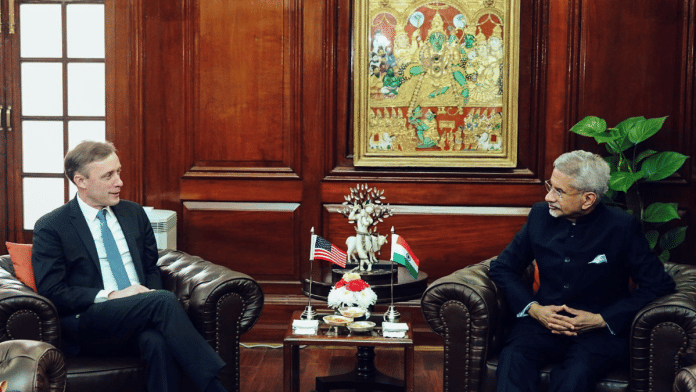New Delhi: The US Monday announced it would be finalising the end of “long-standing regulations” that have prevented civil nuclear cooperation between Indian entities and American companies.
Indian firms would soon be removed from the restricted trade lists, said US National Security Advisor Jake Sullivan in New Delhi.
“Today I can announce that the United States is now finalising the necessary steps to remove long-standing regulations that have prevented civil nuclear cooperation between India’s leading nuclear entities and US Companies,” Sullivan said during an address at the Indian Institute of Technology, Delhi.
The American NSA added: “The formal paperwork will be done soon but this will be an opportunity to turn the page on some of the frictions of the past and create opportunities for entities that have been on restricted lists in the United States to come off those lists and enter into deep collaboration with the United States, with our private sector, scientists and technologists to move civil nuclear cooperation forward together.”
Sullivan is in India for a short two-day visit, which will likely be his last international visit as NSA of US. On 20 January, President-elect Donald Trump will be inaugurated, and he has already announced Representative Michael Waltz as his NSA designate.
During his stay in New Delhi, Sullivan met with his Indian counterpart Ajit Doval, and called on External Affairs Minister S. Jaishankar, and Prime Minister Narendra Modi.
The US administration under President Joe Biden has focused on deepening ties with India during his four-year tenure. The focus of the Biden administration has been to deepen collaboration on technology and defence, while pushing India as a reliable alternative to China.
India-US nuclear history
The announcement of easing regulations to promote civil nuclear partnership is significant, since a number of US administrations have consistently taken aim to stymie the development of India’s nuclear programme from the 1970s.
This changed in 2005, when then US president George Bush and Indian prime minister Manmohan Singh announced a civil nuclear deal, which would see India gain an exemption from the Nuclear Suppliers’ Group (NSG) in return for allowing its civilian reactors to come under inspection of the International Atomic Energy Agency (IAEA).
Singh, who passed away on 26 December, had staked the survival of his government in 2008 on the deal. However, while the deal was successful in resetting ties between New Delhi and Washington, a number of irritants remained in the civil nuclear sector, including India’s liability law passed in 2010.
The removal of any Indian nuclear companies from the entity list, would allow easier partnerships with US firms.
India and the US have also looked to open cooperation in other technological sectors such as artificial intelligence (AI), under the US-India initiative on critical and emerging technology (iCET), which was launched in 2022 by both countries. The initiative has been led by Sullivan and Doval. The American NSA praised Doval for iCET, which he claimed has further strengthened ties between New Delhi and Washington D.C.
Nuclear cooperation had found a mention in the joint statement announced by Biden and Modi after the Indian prime minister’s official state visit to the US in June 2023. At the time, the two leaders welcomed negotiations between the Nuclear Power Corporation of India Limited (NPCIL) and the Westinghouse Electric Company (WEC) for the construction of six nuclear reactors in India.
Along with the nuclear partnership, Sullivan highlighted the Biden administration’s focus on deepening collaboration in the realm of space. India joined the US-led initiative Artemis Accords in June 2023, to boost the space partnership between the two countries.
An Indian astronaut is to be a part of the US-led Axiom-4 mission later this year, which will see them going to the International Space Station (ISS).
Also Read: When President Jimmy Carter lobbied US Congress to allow sales of uranium to India
‘Make in India’ & ‘Made in America’ complementary
The American NSA highlighted how the localisation of manufacturing schemes in both countries—“Make in India” and “Made in America”—were complementary in nature, and not necessarily competitive against one another.
Sullivan highlighted how India has gained as an alternative destination for manufacturing investment, pointing to Apple’s decision to assemble iPhones in the country.
“In the next few years a quarter of all iPhones will be made in India. Ford (Motor Corporation) has announced new investments in Chennai,” pointed out Sullivan, adding there were over 1,000 American companies functioning in India, with over $50 billion in foreign direct investment over the years.
The US NSA also took aim at China for “weaponising interdependence” and for its “predatory industrial strategy”, which have made American firms uncompetitive and overly-reliant on Chinese supply chains.
However, going forward, he cautioned that India and the US must develop a closer alignment of export control restrictions to prevent diversion and misuse of dual-use technologies. In November 2024, the American government sanctioned 19 Indian firms for their trade with Russian entities.
Sullivan also made a mention of the India Middle East Europe Economic Corridor (IMEC), the multi-country project announced at the G20 Leaders’ Summit in New Delhi in September 2023, as a future model of cooperation.
Sullivan said he has spoken about this project with the incoming administration, highlighting the positive role IMEC could play in the region in comparison to anything that China has on offer.
(Edited by Tikli Basu)
Also Read: Trump’s America will be a challenge. It’s also an opportunity for growing economies like ours






